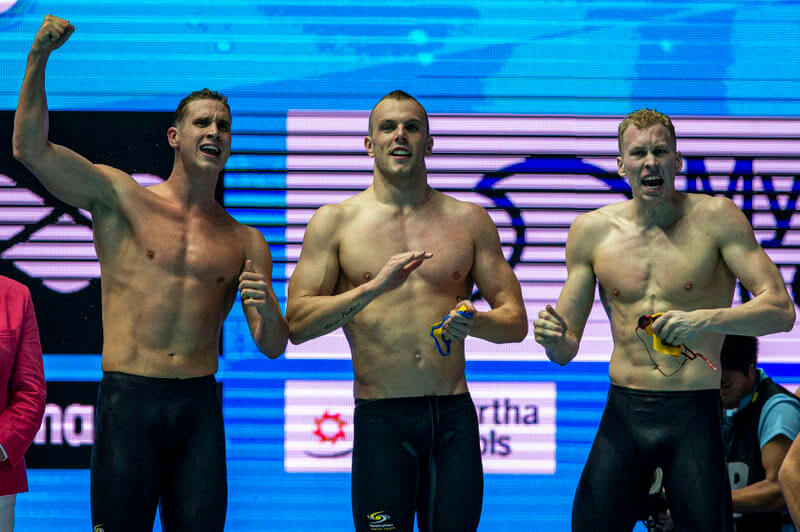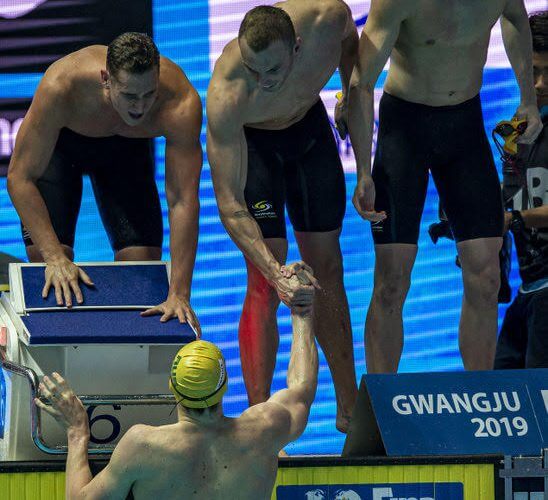Australia Continues Relay Roll as Mack Horton Powers Dolphins to Gold in 4×200 Free Relay

Editorial content for the 2019 World Championships coverage is sponsored by FORM Swim Goggles.
See full event coverage.
Follow FORM on Instagram at @FORMSwim #swimwithform

World Swimming Championships (Australia)
Gwangju, Day 6 finals
Men’s 4×200 freeestyle relay
There was a time, when a guy named Ian Thorpe was the sport’s headliner, that Australia owned the 4×200 freestyle relay on the world stage. During that era of the late 1990s and early 2000s, gold medals in the event were the norm. On Friday night at the World Championships, the Dolphins rekindled memories of those glory days and returned to the top of the podium, a splendid team effort securing the gold medal.
Emerging from a thrilling five-team battle, Australia received an anchor split of 1:44.85 from Mack Horton to take top honors in 7:00.85, good for an Oceania record and enough to turn back Russia (7:01.81) and the United States (7:01.98). Fourth place went to Italy in 7:02.01, Great Britain a tick behind in fifth in 7:02.04. Horton was joined on the winning squad by Clyde Lewis (1:45.58), Kyle Chalmers (1:45.37) and Alexander Graham (1:45.07), the victory marking the fourth gold of the week for the Australians in relays alone.

Photo Courtesy: PATRICK B. KRAEMER
Better known for his ability in the longer freestyle races, Horton headed into the anchor leg with the lead, and faced with the task of repelling charges from the likes of Russia’s Martin Mayutin, Townley Haas of the United States and Great Britain’s James Guy. Not only did Horton hold off his foes, he delivered the fastest split of the event and gave Australia its first global title since it won three straight world championships from 1998-2003, years that sandwiched a 2000 Olympic crown.
During those peak years Down Under, Thorpe was the catalyst, cruising through the water on the anchor leg in his trademark black, full-length bodysuit. There was also the support of Grant Hackett and other key cogs, the combination of talent making the 4×200 free relay a staple of national pride. But when the United States and Klete Keller held off Thorpe and the Aussies at the 2004 Olympics in Athens, Australia’s reign of invincibility came to an end. Obviously, it felt good to end the 15-year drought.
“It’s a very good end (to the week),” Horton said. “Anchor leg is always tough. There’s a lot of pressure on it, but I think it’s always a privilege to be able to anchor your team and put your body on the line for the boys. I think a lot of people in relays over-swim the front end so you can call them out on it and double down. Buck the back end, basically.”
After Lewis covered the opening leg in fourth place, Chalmers moved the Aussies up a position, setting the stage for Graham to produce the best performance of his career. The least-known of the foursome, Graham rose to the occasion and pulled Australia into the lead, along the way passing Britain’s Tom Dean and the USA’s Zach Apple. All Horton had to do was retain the advantage, an easier-said-than-done proposition that the veteran embraced.
Just a few years removed from a toxic environment in which team unity was foreign and the use of prescription medications ran through the team, Australia has developed a positive team atmosphere. The men’s team supports the women. The women back the guys. It’s no surprise then that Australia is pushing the United States in the medal standings, and has been dominant in the relays.
“We’ve been doing a lot of work on our relays,” Graham said. “Throughout the whole year, the freestyle and the medley people have got together. We have been doing changeovers. I also think it comes down to that team environment. We have got such a close team at the moment. It’s a small team but it shows that we are super strong. Everybody is supporting each other and has got each other’s back. I think even tonight that is what it came down to in the end. We’ve got four guys and the two guys this morning who all support each other so much and we can go out there and everybody is just getting in there and doing their job and backing each other.
“Watching Clyde and Kyle jump in and kill their swims, it gave me great confidence as well to jump in and give a good swim. Obviously it boosted Mack as well. He had the quickest leg out of all of us, so it was awesome.”
The bronze medalist in the 200 freestyle, Malyutin split 1:45.42 on his anchor leg to keep Russia in the silver-medal position while Haas, on the strength of a 1:45.16 split, lifted the United States from fifth to the podium. Haas’ effort was a major improvement over what she showed in the individual 200 free, where a clocking of 1:46.37 left him locked out of the final. For Great Britain, which saw its two-title reign come to an end, Duncan Scott led off in a British record of 1:44.91, better than the 1:45.63 in which he shared bronze with Malyutin in the solo 200 free, and quicker than the 1:44.93 that China’s Sun Yang posted to win the individual gold.
Malyutin was joined in the Russian effort by Mikhail Dovgalyuk (1:45.56), Mikhail Vekovishchev (1:45.45) and Aleksandr Krasnykh (1:45.38) while Haas followed Andrew Seliskar (1:45.81), Blake Pieroni (1:44.98) and Apple (1:46.03). Haas has been a stalwart for the United States on this relay and he again answered the call with the massive improvement over his individual swim. Australia, though, wasn’t going to be caught.
“We all just swam like absolute animals,” Lewis said. “I’m stoked.”
Results
| 1 | 7:00.85, OC | Lewis, 1:45.58, | Chalmers, 1:45.37, | Graham, 1:45.05 | Horton, 1:44.85 | ||
| 2 | 7:01.81 | Dovgalyuk, 1:45.56, | Vekovishchev, 1:45.45, | Krasnykh, 1:45.38, | Malyutin, 1:45.42 | ||
| 3 | 7:01.98 | Seliskar, 1:45.81, | Pieroni, 1:44.98, | Apple, 1:46.03, | Haas, 1:45.16 | ||
| 4 | 7:02.01 | Megli, 1:45.86, | Detti, 1:45.30, | Ballo, 1:45.27, | di Cola, 1:45.58 | ||
| 5 | 7:02.04 | Scott, 1:44.91, | Jarvis, 1:45.58, | Dean, 1:46.10, | Guy, 1:45.45 | ||
| 6 | 7:04.74 | Ji, 1:45.48, | Wang, 1:46.17, | Xu, 1:48.13, | Sun, 1:44.96 | ||
| 7 | 7:07.64 | Melo, 1:47.72, | Scheffer, 1:45.97, | de Lucca, 1:47.11, | Correia, 1:46.84 | ||
| 8 | 7:07.65 | Zellmann, 1:47.19, | Miroslaw, 1:47.20, | Heidtmann, 1:46.16 |
.jpg)

- 2017 WORLD CHAMPIONSHIPS
- OFFICIAL MEET PAGE
- WATCH RACE VIDEOS
- LIVE STREAM
- DAY 1 SWIMMING RESULTS
- DAY 2 SWIMMING RESULTS
- DAY 3 SWIMMING RESULTS
- DAY 4 SWIMMING RESULTS
- DAY 5 SWIMMING REULTS
- DAY 6 SWIMMING RESULTS
- DAY 7 SWIMMING RESULTS
- DAY 8 SWIMMING RESULTS
- RESULTS FOR ALL AQUATIC SPORTS
- DAY 8 PRELIMS HEAT SHEETS
- DAY 8 FINALS START LISTS
- FORM Swim for Coaches
- FORM Swim Sponsorships
- FORM Swim Contests
- FORM Swim Media




Go Aussie!!?✨
Mack Horton, who is famous for his acting skill than swimming skill. Bloody idiot!
Think he is most famous for being the reigning Olympic 400m champion….
Think he is most famous for being the reigning Olympic 400m champion….
New drug is nice
Ask the Chinese which one is nicest drug .. they’re the experts
They’re the ones caught poor sport . Drug use is rampant we’re just smarter at covering it.
Congratulations
Australia rules ??????
Davey Dave